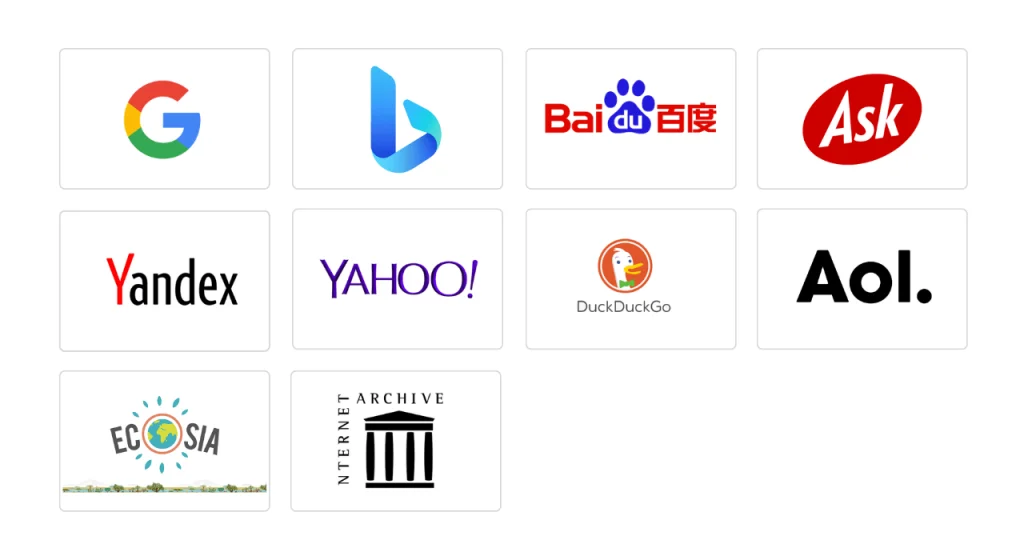- By Hammad Memon
- June 2, 2025
Table of Contents
It’s true that web browsers and search engines must work hand in hand; they’re not the same thing. There are major differences between them – on the one hand, the web browser is what you’re reading this article on, and a search engine helped you find it.
To know more about these differences, let’s dive deeper into this article.
What’s a Web Browser?

By definition, a web browser is actually a software application that helps you to search for an answer and find its results on a single page.
To put it simply, a web browser is a tool that allows you to see what you searched for on the internet.
The most used search engines include Mozilla Firefox, Google Chrome, Microsoft Edge, and more.
If you want to access a web browser, you can just type “www.whateveryouwanttosearch.com” and you’ll get to their web page.
What’s a Search Engine?

A search engine is a tool that helps you find the information you’re looking for. When you type in your question or keywords on the internet, it’s not the web browser that gives you options to search from – it’s the search engine.
Search engines have certain algorithms that help you find results based on your keywords. Some of the most common search engines include Bing, Google, Yahoo Search, and others.
Are Search Engines and Web Browsers safe?
Different web browsers and search engines vary in terms of privacy and security features. Since the internet is fraught with dangers like phishing and malware, it is prudent to understand the advantages and disadvantages of different browsers and search engines.
Leading browsers may not guarantee the best privacy features. Take Google Chrome as an example; it collects all the mounds of data it can legally get its hands on! You can install a Chrome VPN and quit Gmail to ameliorate that situation. You could also use a reliable VPN like SaviourVPN with Firefox or Safari to enhance your security when surfing the web.
Regarding search engines, consider that a lot of them make money by selling your information. Preventing targeted advertising could be your main goal. Maybe you are more concerned about having organic results instead of monetized results cluttering the top of your results list. Using a secure VPN like SaviourVPN while searching for your concerns might be a safe way to browse on any search engine available online.
Major Differences: Search Engines VS Web Browsers
1. Purpose and Functionality
Web Browser:
A web browser allows you to view content that you have searched on the internet, i.e., the final results. For instance, if you search for a reliable VPN and go to the website. www.saviourvpn.com – the website will open on a web browser.
Search Engine:
A search engine helps users find the right piece of information via specific keywords and phrases. Search engines show web pages according to the relevance of the keyword you’ve put in.
2. Installation and Usage
Web Browser:
When you download apps like Google Chrome or Mozilla Firefox, you are downloading web browsers on your phone. When you open these web browsers, they take you to search engines like Yahoo, Bing or Google.
Search Engine:
A search engine can be accessed through a web browser. When you open a web browser, you will see a search engine like Google, Yahoo, or Bing that asks you to write what you want to search. You search your queries on a search engine and will be given multiple results.
3. User Input and Interaction
Web Browser:
When you open a web browser, you may enter a URL like www.saviourVPN.com to visit the website. Browsers can also help you store bookmarks, manage tabs and run extensions.
Search Engine:
You type search queries (for example, “best Italian restaurants near me”). The engine gives you a list of results from which you choose a website to visit.
4. Interdependence
Web Browser:
A browser does not require a search engine if you are aware of the URL of a site to visit. You type in specific websites directly.
Search Engine:
A browser is required to bring the search engine’s webpage and view its output. The search engine cannot be used without a browser.
5. Examples and Brands
Popular Web Browsers:
- Google Chrome
- Mozilla Firefox
- Safari
- Microsoft Edge
- Opera
Popular Search Engines:
- Bing
- Yahoo
- DuckDuckGo
- Baidu
6. Underlying Technology
Web Browser:
When it comes to technology, a web browser uses HTML, JavaScript, and CSS. It also deals with storing cookies, session times, and browser extensions.
Search Engine:
A search engine employs web crawlers (spiders) and complex algorithms to crawl, index, and rank every web page on the internet.
7. Offline Access
Web Browser:
Some browsers allow offline access to previously visited web pages or downloaded content.
Search Engine:
Requires a live internet connection at all times to function since it must access and display current search results.
Conclusions
Web browsers and search engines are two pieces of technology that are often used interchangeably, but they actually have very different jobs in your online experience. A web browser is the software that allows you to access and interact with websites, while a search engine is a service that finds and ranks websites by sifting through data across the internet.
Knowing this difference not only helps you disentangle one of the most common confusions related to these indistinguishable tools, but it also helps you work better with both of them. Whether you’re simply typing in a web address or looking up information, understanding what’s going on under the hood can make you a much more informed and effective internet user.
FAQs
Google is a search engine. Google Chrome is a web browser.
No, you can select and pick your search engines and browsers. More than one web browser can be paired with more than one search engine. For example, you can use Safari with Google or Google Chrome with Bing or Yahoo.
No. Google Chrome (the browser) is compatible with non-Google search engines like Surfshark Search or DuckDuckGo.
Hammad Memon
Hammad is a passionate cybersecurity enthusiast and tech writer dedicated to making online privacy accessible to everyone. With a background in coding and digital security, he breaks down complex VPN and cybersecurity topics into easy-to-understand guides for Saviour VPN’s audience.












